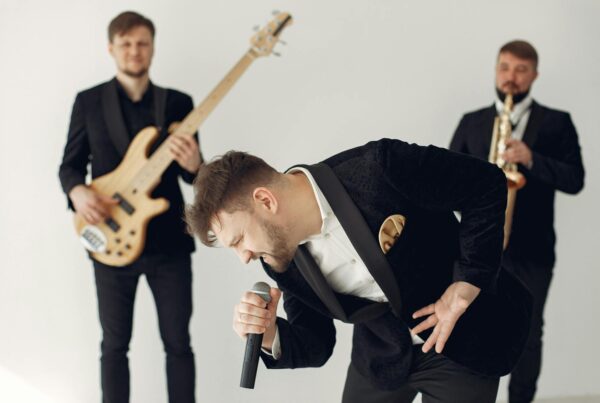Celebrity Singing Styles that Can Hurt Your Voice
Summary
Many famous performers have become known for singing styles that are hard on the vocal cords and can potentially damage them.
In this lesson, I’ll reveal the guidelines for preparing your backing tracks for vocalists and celebrity singing styles that could hurt your voice. Plus, share with you how to safely get the sounds you want without getting your vocal cords into trouble!
Here are the celebrity singing styles you should beware of imitating, followed by ways you can protect your vocal cords while still getting the sounds you want.
1. Super-high pitch
What it is: singing high into the top part of the Head Voice range
Some famous singers associated with this sound: Bruno Mars, Stevie Wonder, Mariah Carey
Why imitating this sound could hurt your voice: trying to force notes above your range can cause vocal strain.
How to safely make this sound: learn how to transition from chest to middle to head voice without holding your breath, or letting your Adam’s apple go up too high. That way you won’t strain or force.
2. Airy (aka. “breathy” voice)
What it is: adding a great deal of extra air to your singing voice
Some famous singers associated with this sound: Selena Gomez
Why imitating this sound could hurt your voice: Singing too airy can dry out your throat and your vocal cords.
How to safely make this sound:
- Drink more water—preferably one-half gallon per day.
- Limit the amount of time you sing this way.
- Breathe diaphragmatically, inhaling through your nose.
3. Squeaky Hinge (aka, “creaky” sounds)
What it is: happens when the vocal cords are vibrating, but there’s insufficient amounts of air coming through
Some famous singers associated with this sound: countless country singers
Why imitating this sound could hurt your voice: vocal cords get red and puffy and swollen when you sing like this
How to safely make this sound:
- Learn how to do diaphragmatic breathing.
- Learn to sing loud while still having some air coming through.
4. Nasal
What it is: When you’re creating too much resonance in your nose all the time, and your Adam’s apple is always high.
Some famous singers associated with this sound: Patti Labelle
Why imitating this sound could hurt your voice: When your Adam’s apple is high, your throat is partially closed, which makes it harder on your voice to perform the way it’s designed to.
How to safely get this sound in your singing voice: Learn to sing the songs with a lowered Adam’s apple, then only add the nasal effect as desired for style.
5. Jaw-wiggle vibrato:
What it is: Quickly bouncing your jaw up and down while sustaining a note in an effort to enhance your vibrato technique rapidly
Some famous singers associated with this sound: Whitney Houston
Why imitating this sound could hurt your voice: creates strain in the muscles of the jaw that you need to keep relaxed in order to sing without pressure.
How to safely get this sound in your singing voice: Learn proper vibrato techniques that use airflow instead of jaw tightening to create the effect without tightness or muscle pressure. (Here is a lesson to help you learn vibrato!)
Did you like this episode?
Please spread the “Love” by sharing this with your friends. Remember, I’m working to save the world one voice at a time, starting with yours. You’re my family now, and we need to work together to extend our mission and reach. The more you share, the more I can share with you, and we can actually help people globally find their voices and change their lives for the better.
Ready for your best life? Find your singing solutions here.
[apss_share]
Play the Audio of this post:
TRANSCRIPT
Hi, I’m Roger Love, celebrity voice coach and author of the bestselling book Set Your Voice Free. Today, I want to talk to you about certain celebrity singing styles that could ruin your voice. As a singer, we all grow up imitating other singers. I used to love Stevie Wonder, and I would just sing Stevie Wonder songs, and when he went up high, I would go up high. When he would go down low, I would go down low. And the techniques that I was learning as a young person allowed me to access all of that range, chest voice down low, middle voice in the middle, and head voice when it went up high.
But a lot of people who are singing very, very range-y songs or imitating other artists who sing super high, for example, Bruno Mars, who sings very much like Stevie Wonder does in the same ranges—if you’re trying to sing along with a Bruno Mars song and you don’t have a great middle voice and a great head voice, then you are straining as you go from the low notes to the high notes. You’ve got your stomach tight. You don’t have the breathing down. You’ve got your face all tense. Your two eyebrows have become one eyebrow. Your butt cheeks are pressed up against each other, because you have so much tension, and you’re stuck in chest voice. So, Bruno is soaring above the clouds with all of the notes he’s hitting, and you’re stuck planted in the ground in chest voice and straining and shouting.
Well, if you’re doing that, you are straining your voice, and you need to learn how to do the middle voice and the head voice. There’s lots of techniques that can mess up your voice that you’re hearing other celebrities do. For example, there are a lot of celebrities that sing quite airy. A number of my students do. Let’s take Selena Gomez, who I love, and the songs are great, and she sings them beautifully, and she sings some of them very airy, “can’t keep my hands to myself.” So, if you’re trying to sing all of your songs airy, all day, all night, trying to be like Selena, you are actually making your vocal cords super dry, because all of that extra air is like creating a wind burn effect on your cords. All that air is making your beautiful pink cords red and puffy and swollen. So, can you sing airy? Yes, once you’ve learned how to do diaphragmatic breathing, when you control how to get amazing amounts of air in and how to get amazing amounts of air out. When you have diaphragmatic breathing, it’s easier to sing airy. But nobody, including Selena, can sing airy all the time, so be careful when you’re singing too airy that you don’t dry out your throat, and be drinking lots of water. And like I said, learn how to do diaphragmatic breathing, and it will be easier.
Now, in country, there’s a lot of this sound, which I call the squeaky hinge. “I’m here for you, baby. Aaaaah.” And that sound might be really cool if you’re sitting on the porch with a country singer, and they’re playing the guitar, and they’re addressing their beautiful song to you. But actually, that sound happens when the vocal cords are vibrating, but there’s insufficient amounts of air coming through, so then your vocal cords get red and puffy and swollen when you sing like this, even if it’s cool. So, OK, it’s cool. You still need to learn how to do diaphragmatic breathing. You still need to learn to sing up loud enough that you have some air coming through. Use cool sounds sparingly if you already know they’re hard on your voice.
Also, a lot of singers sing in their nose, not just country artists. They’re singing like this. It’s a style where everything goes in your nose, and it’s become quite popular. I just came back from Nashville, and I went to the Grand Ole Opry. It was a beautiful night. We had such a great time. But a lot of the singers were singing in their nose. Well, so, again, cool sometimes, but when you’re stuck in your nose singing all the time, your Adam’s apple is always high, and when your Adam’s apple is high, your throat’s closed, so actually, you’re making it harder on your voice. And if you keep singing only in your nose with your Adam’s apple up, your throat gets more closed and more closed and more closed, and then your vocal cords get red and puffy and swollen, and you’re singing like you have a cold all the time, and your voice isn’t healthy. So, again, you like a little bit of nasality? Great, use it sparingly. You like a lot of airy sounds? Great, use it sparingly. You like high notes? Learn how to do chest, middle, and head.
There are singers that have become superstar singers. I remember Whitney Houston used to do this with her vibrato. She would shake her jaw. And if you see some singers, you watch them. They’ll do the same thing. “And I— will always love you—,” and they’re dropping their jaw like that, trying to make vibrato. And you’re like, “Why are they doing that? Is that OK?” And then suddenly, you’re doing that with your jaw, “I—,” trying to make vibrato. But doing that with your jaw creates a ton of pressure in your jaw, and that pressure, that tension, goes right here to the strap muscles, which control the position of the larynx. So, if you’re all tight with your jaw, trying to shake it up and down, you’re actually putting pressure on the muscles that control the opening and closing of your throat, and the fact that your Adam’s apple comes up and down, and what the vocal cords are doing. So, if you do things that put pressure on your jaw, you’re straining your voice, so don’t learn how to do vibrato like that.
Be careful that, when you are imitating sounds that you hear other artists doing, if you feel pain or strain from those sounds, you need to stop, try to figure out what sound it is—is there a way to lower your Adam’s apple, so that that opens up your throat? Is there a way to stop tightening your stomach and do diaphragmatic breathing? Is there a way to go into middle voice or head voice to take away the pressure? Are they singing so loud that, if you just sang a little softer, you’d have seventy-five percent less pressure? You have to be smart about this.
So, the key things to pay attention to—straining by imitating the styles you like. You might love rock singers who have this kind of a sound. Oh, they’ve got this kind of thing where they have all this crunchy “I just ate razor blades for breakfast” kind of a voice, and you’re like, “Wow, that’s cool. I want to do that. I want to sound like I grew up on the street. I don’t want to sound like I grew up on the streets of Beverly Hills. That’s not cool.” So, to get that kind of sound like that, again, hard on the vocal cords—can you make that sound? Yes! Is it easier when you do diaphragmatic breathing? Yes. Should you only do it in moderation? Yes. I want you to have a voice that is full of style and sounds amazing, and I want you to be able to imitate and sing along with all the artists that you love. I just want you to do it without creating any pressure here, keeping your Adam’s apple down, learning how to do diaphragmatic breathing, going from chest to middle to head, and then you will not ruin your voice by singing along with singers that have potential of ruining their voices, along with your voices.
Follow these very simple rules that I have given you today, and your voice will be amazing. You will find your style, and you will sound incredible and never ruin your voice. I’m Roger Love, and I can’t wait to listen to you and talk to you again.
Get 4 Free Voice Training Videos That Reveal How You Can Discover Your Perfect Voice
By submitting your email address, you agree to receive emails for this training and special offers. Unsubscribe, anytime.





Thank you. Roger, for this information. I enjoy your videos very much.
Hi Roger here’s Patrick from Tuscany.
I really would like to improve more by singing with strongness all the notes through the middle voice. The exercises You gave me are certainly the right one, but I do ask myself if You could give me some other kind of exercises that could help me to reach more power and strongness in my middle voice.
thanks
Patrick